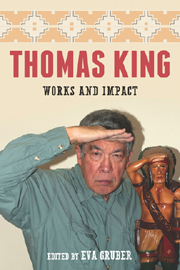Book contents
- Frontmatter
- Contents
- Preface
- Introduction
- Part 1 Works
- Part 2 Impact
- Part 3 Approaches
- Part 4 Encounters
- 16 Storytelling in Different Genres: A Conversation with Thomas King
- 17 Thomas King and the Art of Unhiding the Hidden
- 18 The Truth about Thomas
- 19 Misdirection Is Still a Direction: Thomas King as a Teacher
- 20 Tom King and the Dead Dog Café
- 21 Dead Dog Café: Being an Indian on Air
- Part 5 Thomas King—A Bibliography
- Notes on the Contributors
- Index
16 - Storytelling in Different Genres: A Conversation with Thomas King
from Part 4 - Encounters
Published online by Cambridge University Press: 05 February 2013
- Frontmatter
- Contents
- Preface
- Introduction
- Part 1 Works
- Part 2 Impact
- Part 3 Approaches
- Part 4 Encounters
- 16 Storytelling in Different Genres: A Conversation with Thomas King
- 17 Thomas King and the Art of Unhiding the Hidden
- 18 The Truth about Thomas
- 19 Misdirection Is Still a Direction: Thomas King as a Teacher
- 20 Tom King and the Dead Dog Café
- 21 Dead Dog Café: Being an Indian on Air
- Part 5 Thomas King—A Bibliography
- Notes on the Contributors
- Index
Summary
The following interview with Thomas King took place on 27 March 2011, in his home on Water Street in Guelph, Ontario. The conversation we had turned out much too long, so that it had to be edited for publication. I started the interview by quoting to him from the Fee/Gunew interview (1999), in which he said he wasn't going to give interviews to people he didn't know anymore, especially not to Germans. I'd read that shortly before our scheduled meeting and suddenly didn't want to do the interview any longer…
TK: Yeah, I'm sorry I said that about Germans.… At least they published my books in translation.
EG: Yes, they did. Green Grass, Running Water and Medicine River.
TK: I'm surprised they tried to do Green Grass, Running Water in German. I just cannot imagine.
EG: It loses a lot. I discussed it in an article on translating Native literature, and a lot of the wordplay, it's gone.
TK: When they translated Medicine River into French, there was a point when one character calls the other character a fruit, and basically it's a slang term for queer, a homosexual, and when they translated it into French, they translated it as vegetable, “You're a vegetable,” which made no sense in French and no sense to me whatsoever.
EG: [laughs] Okay. I thought that was too bad that a lot of the wordplay in Green Grass, Running Water was lost, but still I'm glad that they published it in German, because I'm so enthusiastic about the book.
- Type
- Chapter
- Information
- Thomas KingWorks and Impact, pp. 257 - 280Publisher: Boydell & BrewerPrint publication year: 2012

